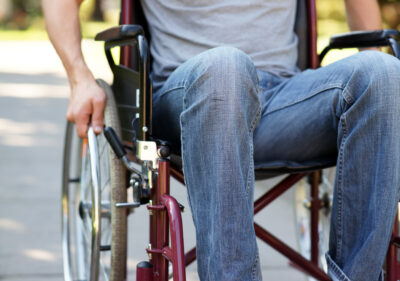Speak to a member of our expert team about your paralysis claim. Find out if you can claim compensation.
CALL 0800 083 5500

Let’s take a detailed look at the four main types: monoplegia, hemiplegia, paraplegia, and quadriplegia.
Monoplegia refers to paralysis affecting a single limb, either an arm or a leg.
The good news is that monoplegia can have a good prognosis, with recovery possible depending on the underlying cause and severity. Early diagnosis and intensive therapy, including physical and occupational therapy, can significantly improve muscle function and help you regain control of the affected limb.
Hemiplegia refers to paralysis affecting one half of the body, typically involving both an arm and a leg on the same side.
Recovery prospects from hemiplegia can vary greatly, depending on the extent of brain damage and the individual’s overall health. With intensive therapy and rehabilitation, significant improvements in bodily function and independence are often possible.
Paraplegia refers to paralysis affecting the lower half of the body, including both legs and sometimes the torso.
The prognosis for paraplegia depends on the level of spinal cord injury. Complete injuries with no nerve regeneration potential may require lifelong assistance and adapted equipment for mobility. However, advancements in rehabilitation and technology offer hope for regaining some function and improving independence.
Jason Brady, Medical Negligence Partner was able to secure compensation after signs of Cauda Equina Syndrome were missed.
Quadriplegia, also known as Tetraplegia, refers to paralysis affecting all four limbs and often involving the diaphragm and other muscles crucial for breathing as well.
The prognosis for quadriplegia varies greatly depending on the level and severity of the injury. While complete recovery of all functions is rare, advancements in rehabilitation, technology, and assistive devices offer hope for improving independence and quality of life. Intensive therapy programs can help individuals regain some functionality, learn adaptive techniques, and maximise their independence. Additionally, specialised equipment like robotic arms, brain-computer interfaces, and advanced wheelchairs can greatly improve daily living.
Tragically, paralysis can also be the result of medical negligence. If a medical professional’s actions or omissions fall below acceptable standards, leading to paralysis, you may be entitled to paralysis compensation.
Blackwater Law, a leading UK firm specialising in medical negligence cases, can help you understand your rights and navigate the legal process. If you or a loved one has suffered paralysis due to suspected medical negligence, contact Blackwater Law for free initial advice and support. Their experienced team will assess your case, guide you through the legal process, and fight for the compensation you deserve.
